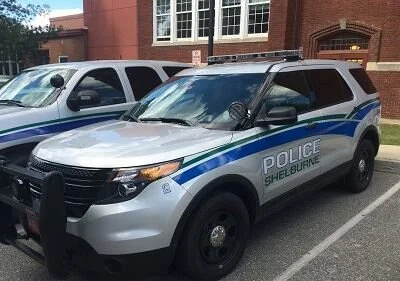College recognizes Shelburne resident for community service: Fontaine champions equity, diversity, racial justice
From left, Patricia Fontaine receives the Community Service Award from Community College of Vermont president Joyce Judy. Courtesy photo.
Shelburne resident Patricia Fontaine won the Community College of Vermont’s Community Service Award, given each year in recognition of sustained and profound service to Vermont.
Fontaine was a college faculty member and continues to support the college philanthropically as well as inspire programs like the Abenaki speaker series. In addition, she has many roles within the community as an educator, poet and advocate for social and racial justice.
The award was given at the college’s June 5 virtual commencement ceremony.
“I moved to Shelburne in 2004 and I had no idea what civic engagement meant,” said Fontaine. “To be not just someone who lives in a town but to be involved in a town is unbelievably eye opening.”
She has had what she calls a “checkered career,” working in mental health, education and social services before beginning her work with nonprofits focusing on social and racial justice.
“Along the way there were people way smarter than me who were willing to suggest and inspire,” said Fontaine.
“Some of my biggest inspirations have been my students,” she said. “They were often leaning into issues that they were kind of discovering for the first time and really having the courage and the willingness to go into some of those hard places. That was really inspiring.”
Fontaine has become a voice for racial justice in the community, serving on Shelburne’s diversity and equity Committee and the social services committee.
“We’re hoping to bring awareness and education and equity to the town,” she said, speaking about her work with the equity committee, which was established in 2021.
“Systemic racism is something that infiltrates policies, procedures, programming,” Fontaine said. “So to unpack that in a way that is not only a learning experience but creates effective accessibility for people who are underserved.”
For the last three years, Fontaine has led book discussion and activism groups, noting that it is not enough to just read about racial justice, but instead one should engage with the work in a setting that can provide support and accountability.
“Folks can come and actually spend some time talking about what it means to take effective action and how to do that well and how to do that in community,” said Fontaine, referencing the book group Engaging White Awareness. “It’s a big opportunity for many of us, as white people, to realize we don’t have to do it alone.”
Fontaine’s activism inspired an Abenaki speaker series at the college. After noticing that the Winooski campus was on Abenaki Way, she inquired about the college’s relationship with the Abenaki people.
“It’s all about relationships. Don’t assume who we are — get to know people. Get to know the Abenaki people, the sovereign stewards of this land, and not just make assumptions,” she said.
“Everybody has a story. That’s one of the things I’ve always known and felt and experienced,” said Fontaine. “We just have to have the opportunity and the grace to listen.”
Fontaine also has what she calls “heart work,” leading art and writing classes. Writing and drawing had a strong impact on Fontaine when she was struggling with an intense cancer diagnosis. This led her to begin poetry workshops for individuals with cancer in 2009, which expanded over time to include those dealing with illness and caregivers.
“It is not a support group or a therapy group but a way to use creativity to deal with illness,” said Fontaine. “I am so proud of it because of the people that have shaped it from 2009 to the present.”
Fontaine is working on a collection of poetry reflecting on being “othered” in the world, due to her facial birthmark.
“Art is something we have a birthright to as human beings,” she said.
In addition to her support for the arts, Fontaine finds her “antidote for stress” at Shelburne Farms, volunteering with raptor rehabilitation at Outreach for Earth Stewardship.
“It’s a lovely thing, to have a relationship with the natural world. It’s what we’ve got. We’ve got this earth, we’ve got the birds, and we’ve got each other,” she said.
Though Fontaine was honored by the award, she said, “An award is about the people behind it. The recipient is at the end of a long chain of other people who have been supporting and helping create the conditions for that to happen.”
To view published article in the Shelburne News, click here.








